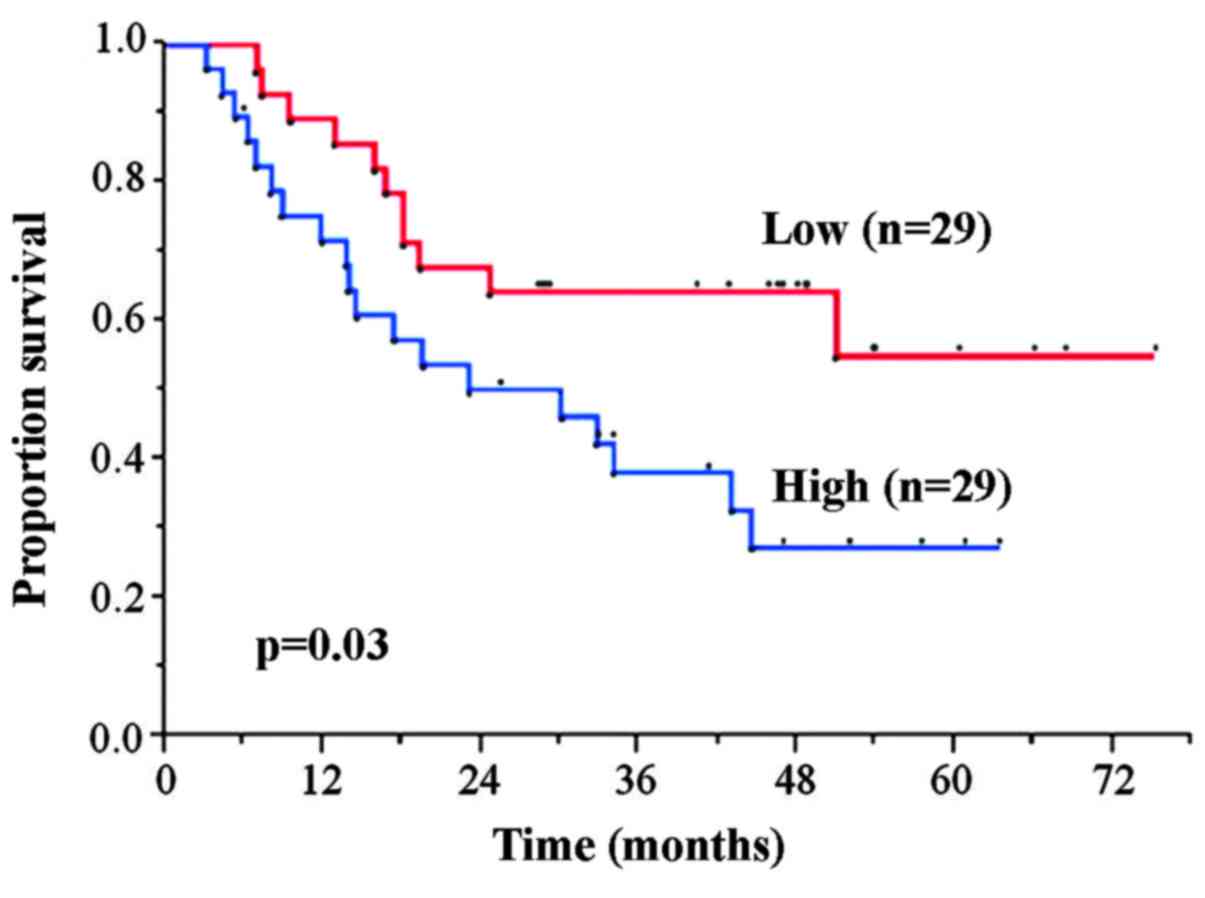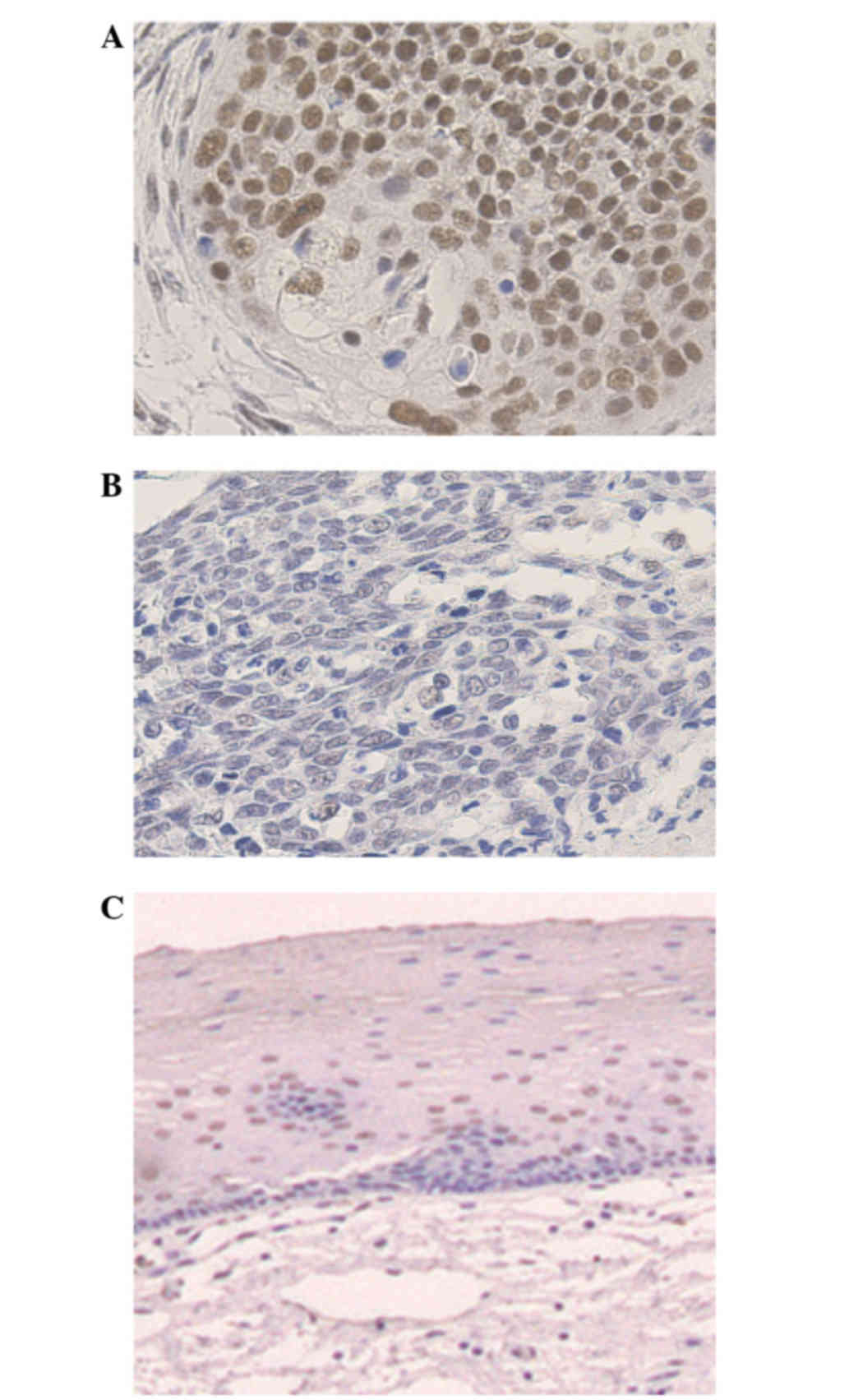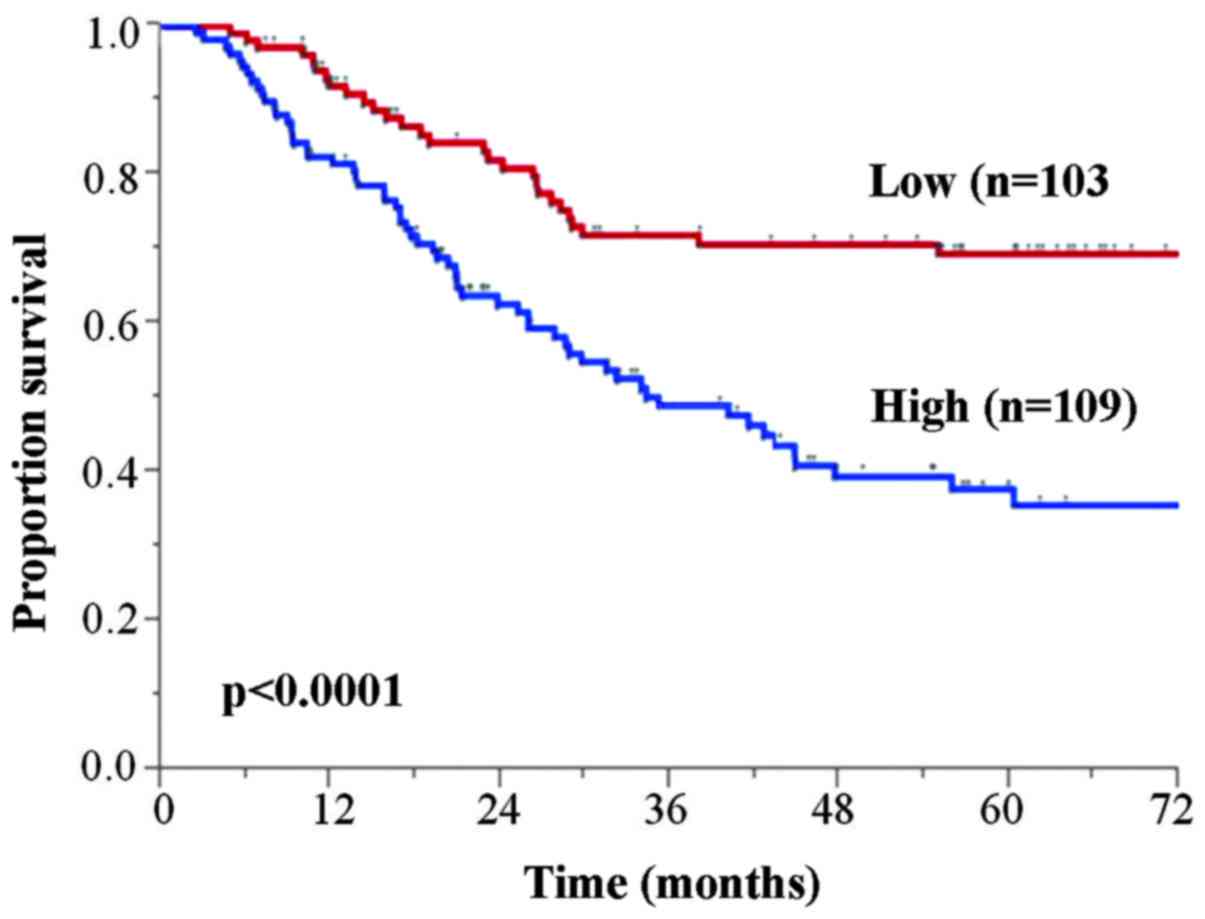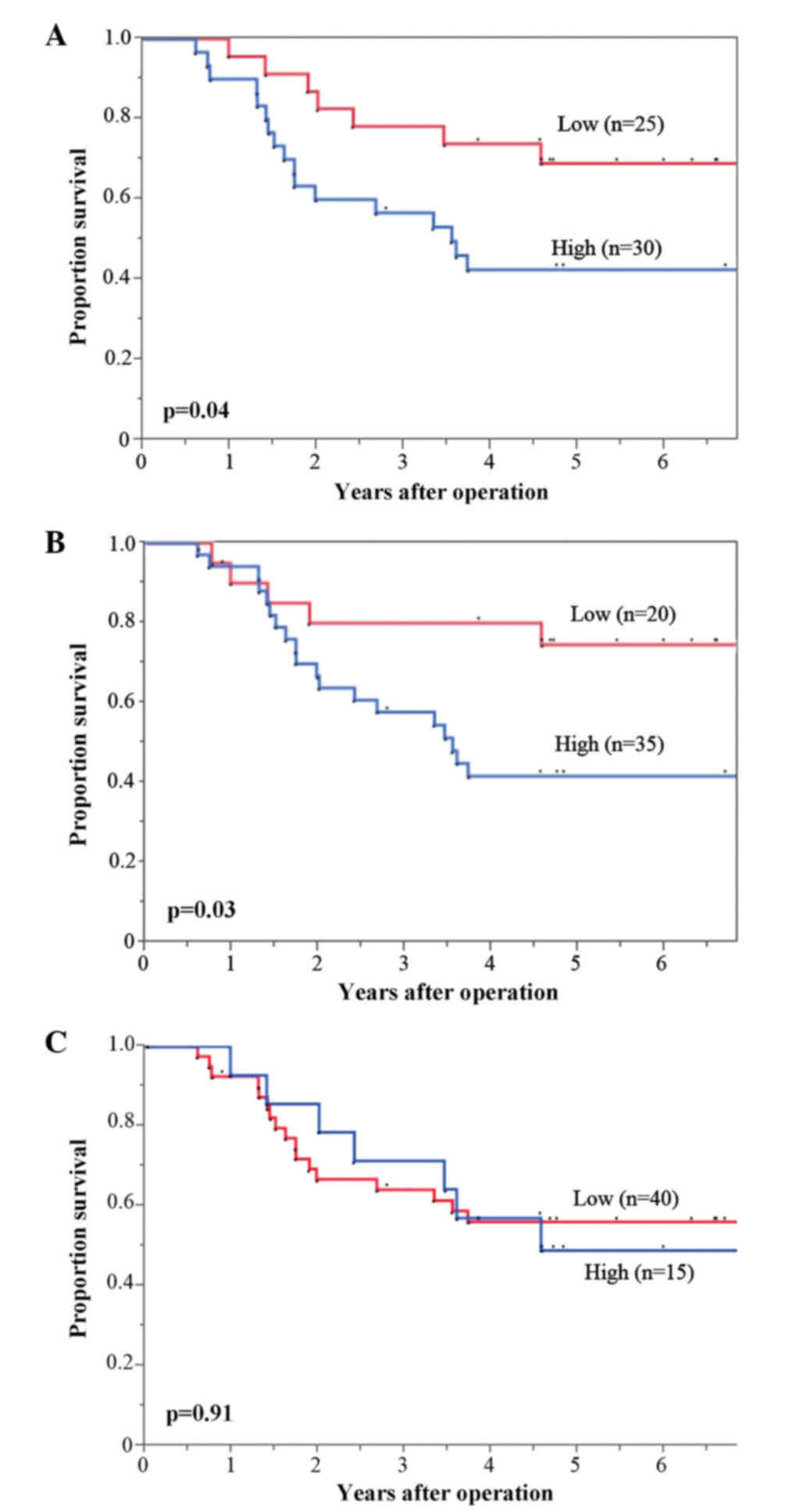|
1
|
Jemal A, Siegel R, Ward E, Hao Y, Xu J and
Thun MJ: Cancer statistics, 2009. CA Cancer J Clin. 59:225–249.
2009. View Article : Google Scholar : PubMed/NCBI
|
|
2
|
Fujita H: The history of lymphadenectomy
for esophageal cancer and the future prospects for esophageal
cancer surgery. Surg Today. 45:140–149. 2015. View Article : Google Scholar : PubMed/NCBI
|
|
3
|
Sobin LH, Gospodarowicz MK and Wittekind
Ch: Oesophagus including oesophagogastric junctionTNM
Classification of Malignant Tumors. 7th. Wiley-Blackwell; Oxford:
pp. 65–72. 2009
|
|
4
|
Sorger PK: Heat shock factor and the heat
shock response. Cell. 65:363–366. 1991. View Article : Google Scholar : PubMed/NCBI
|
|
5
|
Qian SB, McDonough H, Boellmann F, Cyr DM
and Patterson C: CHIP-mediated stress recovery by sequential
ubiquitination of substrates and Hsp70. Nature. 440:551–555. 2006.
View Article : Google Scholar : PubMed/NCBI
|
|
6
|
Page TJ, Sikder D, Yang L, Pluta L,
Wolfinger RD, Kodadek T and Thomas RS: Genome-wide analysis of
human HSF1 signaling reveals a transcriptional program linked to
cellular adaptation and survival. Mol Biosyst. 2:627–639. 2006.
View Article : Google Scholar : PubMed/NCBI
|
|
7
|
Dai C, Whitesell L, Rogers AB and
Lindquist S: Heat shock factor 1 is a powerful multifaceted
modifier of carcinogenesis. Cell. 130:1005–1018. 2007. View Article : Google Scholar : PubMed/NCBI
|
|
8
|
Li S, Ma W, Fei T, Lou Q, Zhang Y, Cui X,
Qin X, Zhang J, Liu G, Dong Z, et al: Upregulation of heat shock
factor 1 transcription activity is associated with hepatocellular
carcinoma progression. Mol Med Rep. 10:2313–2321. 2014.PubMed/NCBI
|
|
9
|
Santagata S, Hu R, Lin NU, Mendillo ML,
Collins LC, Hankinson SE, Schnitt SJ, Whitesell L, Tamimi RM,
Lindquist S and Ince TA: High levels of nuclear heat-shock factor 1
(HSF1) are associated with poor prognosis in breast cancer. Proc
Natl Acad Sci USA. 108:18378–18383. 2011. View Article : Google Scholar : PubMed/NCBI
|
|
10
|
Enders GH: Cyclins in breast cancer: Too
much of a good thing. Breast Cancer Res. 4:145–147. 2002.
View Article : Google Scholar : PubMed/NCBI
|
|
11
|
Quackenbush J: Microarray data
normalization and transformation. Nat Genet. 32:(Suppl). S496–S501.
2002. View
Article : Google Scholar
|
|
12
|
Brazma A, Hingamp P, Quackenbush J,
Sherlock G, Spellman P, Stoeckert C, Aach J, Ansorge W, Ball CA,
Causton HC, et al: Minimum information about a microarray
experiment (MIAME)-toward standards for microarray data. Nat Genet.
29:365–371. 2001. View Article : Google Scholar : PubMed/NCBI
|
|
13
|
Khalil AA, Kabapy NF, Deraz SF and Smith
C: Heat shock proteins in oncology: Diagnostic biomarkers or
therapeutic targets? Biochim Biophys Acta. 1816:89–104.
2011.PubMed/NCBI
|
|
14
|
Ciocca DR and Calderwood SK: Heat shock
proteins in cancer: Diagnostic, prognostic, predictive and
treatment implications. Cell Stress Chaperones. 10:86–103. 2005.
View Article : Google Scholar : PubMed/NCBI
|
|
15
|
Kaigorodova EV and Bogatyuk MV: Heat shock
proteins as prognostic markers of cancer. Curr Cancer Drug Targets.
14:713–726. 2014. View Article : Google Scholar : PubMed/NCBI
|
|
16
|
Ciocca DR and Vargas-Roig LM: Hsp27 as a
prognostic and predictive factor in cancer. Prog Mol Subcell Biol.
28:205–218. 2002. View Article : Google Scholar : PubMed/NCBI
|
|
17
|
Kim KK, Jang TJ and Kim JR: HSP70 and ER
expression in cervical intraepithelial neoplasia and cervical
cancer. J Korean Med Sci. 13:383–388. 1998. View Article : Google Scholar : PubMed/NCBI
|
|
18
|
Chuma M, Sakamoto M, Yamazaki K, Ohta T,
Ohki M, Asaka M and Hirohashi S: Expression profiling in multistage
hepatocarcinogenesis: Identification of HSP70 as a molecular marker
of early hepatocellular carcinoma. Hepatology. 37:198–207. 2003.
View Article : Google Scholar : PubMed/NCBI
|
|
19
|
Wu C: Heat shock transcription factors:
Structure and regulation. Annu Rev Cell Dev Biol. 11:441–469. 1995.
View Article : Google Scholar : PubMed/NCBI
|
|
20
|
Calderwood SK, Xie Y, Wang X, Khaleque MA,
Chou SD, Murshid A, Prince T and Zhang Y: Signal transduction
pathways leading to heat shock transcription. Sign Transduct
Insights. 2:13–24. 2010. View Article : Google Scholar : PubMed/NCBI
|
|
21
|
Khaleque MA, Bharti A, Gong J, Gray PJ,
Sachdev V, Ciocca DR, Stati A, Fanelli M and Calderwood SK: Heat
shock factor 1 represses estrogen-dependent transcription through
association with MTA1. Oncogene. 27:1886–1893. 2008. View Article : Google Scholar : PubMed/NCBI
|
|
22
|
Gabai VL, Meng L, Kim G, Mills TA,
Benjamin IJ and Sherman MY: Heat shock transcription factor Hsf1 is
involved in tumor progression via regulation of hypoxia-inducible
factor 1 and RNA-binding protein HuR. Mol Cell Biol. 32:929–940.
2012. View Article : Google Scholar : PubMed/NCBI
|
|
23
|
Lyu X, Huang J, Mao Y, Liu Y, Feng Q, Shao
K, Gao S, Jiang Y, Wang J and He J: Adjuvant chemotherapy after
esophagectomy: Is there a role in the treatment of the lymph node
positive thoracic esophageal squamous cell carcinoma? J Surg Oncol.
110:864–868. 2014. View Article : Google Scholar : PubMed/NCBI
|
|
24
|
Ruiz MI Gallegos, Floor K, Roepman P,
Rodriguez JA, Meijer GA, Mooi WJ, Jassem E, Niklinski J, Muley T,
van Zandwijk N, et al: Integration of gene dosage and gene
expression in non-small cell lung cancer, identification of HSP90
as potential target. PLoS One. 3:e00017222008.PubMed/NCBI
|
|
25
|
Nakamura M, Iwahashi M, Nakamori M, Ojima
T, Katsuda M, Iida T, Hayata K, Kato T and Yamaue H: New prognostic
score for the survival of patients with esophageal squamous cell
carcinoma. Surg Today. 44:875–883. 2014. View Article : Google Scholar : PubMed/NCBI
|
|
26
|
Pick E, Kluger Y, Giltnane JM, Moeder C,
Camp RL, Rimm DL and Kluger HM: High HSP90 expression is associated
with decreased survival in breast cancer. Cancer Res. 67:2932–2937.
2007. View Article : Google Scholar : PubMed/NCBI
|
|
27
|
Solit DB, Scher HI and Rosen N: Hsp90 as a
therapeutic target in prostate cancer. Semin Oncol. 30:709–716.
2003. View Article : Google Scholar : PubMed/NCBI
|
|
28
|
Romani AA, Crafa P, Desenzani S, Graiani
G, Lagrasta C, Sianesi M, Soliani P and Borghetti AF: The
expression of HSP27 is associated with poor clinical outcome in
intrahepatic cholangiocarcinoma. BMC Cancer. 7:2322007. View Article : Google Scholar : PubMed/NCBI
|
|
29
|
Bauer K, Nitsche U, Slotta-Huspenina J,
Drecoll E, von Weyhern CH, Rosenberg R, Höfler H and Langer R: High
HSP27 and HSP70 expression levels are independent adverse
prognostic factors in primary resected colon cancer. Cell Oncol
(Dordr). 35:197–205. 2012. View Article : Google Scholar : PubMed/NCBI
|
|
30
|
Smyth T, Van Looy T, Curry JE,
Rodriguez-Lopez AM, Wozniak A, Zhu M, Donsky R, Morgan JG, Mayeda
M, Fletcher JA, et al: The HSP90 inhibitor, AT13387, is effective
against imatinib-sensitive and -resistant gastrointestinal stromal
tumor models. Mot Cancer Ther. 11:1799–1808. 2012. View Article : Google Scholar
|
|
31
|
Wagner AJ, Agulnik M, Heinrich MC,
Mahadevan D, Riedel RF, von Mehren M, Trent J, Demetri GD, Corless
CL and Yule M: Dose-escalation study of a second-generation
non-ansamycin HSP90 inhibitor, onalespib (AT13387), in combination
with imatinib in patients with metastatic gastrointestinal stromal
tumour. Eur J Cancer. 61:94–101. 2016. View Article : Google Scholar : PubMed/NCBI
|


















